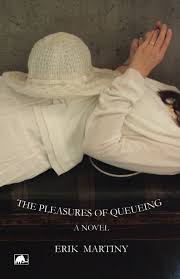The Pleasures of Queueing: a novel. Erik Martiny

Montcocq’s Complaint comes to Bishopstown.
Named after a poem by e e cummings, birthed by a devout and fertile Irish mother and fathered by a priapic Frenchman of ‘archetypal proportions’ Olaf Montcocq screams into existence at Erinville Hospital in 1971.
J’accuse writer Erik Martiny – notice his Scandinavian prénom and his Gallic nom de famille –of indulging in exaggerated semi-autobiography. But he specifies, in the subtitle, that it is a novel and notes that any person resembling the entirely fictitious characters should flee to Brazil.
The parameters are set. The world is built. And it is a world familiar to many of this paper’s readers. A house in suburban Cork, a large number of children, regular attendance at mass, local day schools followed by a sojourn at University College Cork. Indeed it is a world, very familiar, to Dr. Martiny himself – he even chooses to quote Lee Jenkins, his erstwhile Professor of English and Head of School at UCC, on the back cover.
Perhaps Jenkins, joint editor of The Cambridge Companion to Modernist Poetry, supervised Martiny’s doctorate on Contemporary Poetry but, at any rate, she loves this novel saying that it is ‘hilarious and heartfelt in equal measure’ and that it is a ‘story of bohemia and bountiful creation with the verve and verbal inventiveness of early Philip Roth’. Some accolade. But hers is a brilliant assessment of the novel. Jenkins shows appreciation of Martiny by emulating his style using poetic devices such as alliteration, assonance, repetition and word patterns to produce something as bouncy as a blown-up condom.
Written in the first person The Pleasures of Queueing begins, like Tristram Shandy, with its protagonist getting conceived, in this case after three hours in the missionary position. It ends with a surreal scene on the Irish Sea in which Olaf meets a number of dead writers in a cross channel ferry sauna. Virginia Woolf, Ernest Hemingway, Jane Austen and George Orwell, along with a chorus of self-styled Anglo-Irish writers, join forces to give him succour and encouragement.
Lurking in the background of this novel I can see a putative doctorate in which a widely read, disciplined graduate might plough each chapter for clues to its inspirational muse. Olaf Montcocq, Erik Martiny’s alter-ego, could have delved into the likelihood of James Joyce or Samuel Beckett. But, no, of course not. Olaf Montcocq, like Erik Martiny, is writing this novel, The Pleasures of Queueing. Maybe I should write the thesis myself?
Queueing in the Montcocq house often, as in Roth’s Portnoy’s Complaint, involves the bathroom but also the dining/kitchen/sitting room tables. The 25 siblings need space to do their homework. Girls outnumber boys. Singletons outnumber twins, but only just. Martiny presents the home as a madhouse, describing it as ‘totally and felicitously dysfunctional’.

Anna Montcocq is a goddess of fecundity lactating an endless supply of breast milk for her endless supply of children but so prolific that there is plenty remaining to be pumped out and manufactured into soft cheese by their thrifty father, Martin. He turns out a type of Roquefort as well as Irish Cheddar. These delicacies are stored in the fridge and placed between doorstep slices of bread for packed lunches.
Other secretions, as can be expected, seep or spurt. The second brother is nicknamed Brian de Sperm and at one point the pages of the Norton Anthology of Poetry in English get stuck together after an in-lecture mutual masturbation session. After that Robert Herrick’s famous lyric ‘Corinna’s Going a-Maying’ is ‘forever inaccessible’.

Martiny tops and tails each chapter with a list of selected world events and births and deaths. In this way he provides cultural context for his bildungsroman. But for unfortunates who were not brought up in the city of Cork The Pleasures of Queueing, like Lisa McInerney’s Ryan Cusak novels, provides an intriguing insight into what it must be like.
Works Cited
Jenkins, L. and Davis, A. Eds. The Cambridge Companion to Modernist Poetry. 2007. CUP.
Martiny, E. The Pleasures of Queueing: a novel. 2018. Mastodon.
McInerney, L. The Glorious Heresies. 2015. John Murray.
—. Blood Miracles. 2017. John Murray.
Roth, P. Portnoy’s Complaint. 1969. Penguin.
Stern, L. The Life and Opinions of Tristram Shandy, Gentleman. 1759. Becket and DeHondt.
A version of this review first appeared on page 36 of the Weekend section in the Irish Examiner on October 13th 2018. It is reproduced here by permission of the Editor.